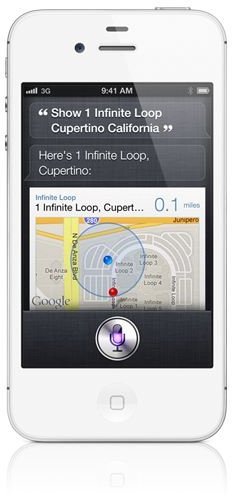Voice Control Battle: WP vs Google vs Siri
One of the biggest advancements in mobile phone software over the past few months has been in voice control. Android Voice Actions, Siri for iPhone and Windows Phone’s Tellme voice tool all offer considerable advantages for hands-free use, but which of these is best?
As anyone who follows the mobile phone industry will know, Siri is the big star of the new iPhone 4S handset. Meanwhile, Voice Actions for Android is a new app from Google that can be downloaded to your Android phone, and offers its own wide selection of voice controls.
Previously we’ve attempted to compare Siri with Voice Actions for Android, and discovered that each has its particular strengths and weaknesses. But how do they stand up against Microsoft’s own entry into the market of voice control tools? Released as part of the Windows Phone 7.5 Mango upgrade in late 2011, these voice enhancements add some particularly useful features to the platform which pre-date both Siri and Voice Actions for Android by several weeks.
Let’s see how they all compare…
Hands-free Communication
The first way in which the three voice activated services should be tested is, of course, hands-free. Using a mobile phone while driving is illegal in many countries unless you have a hands-free device – these tools can potentially save lives.
On Windows Phone, the voice commands allow the user to call a contact, simply by saying “Call…” followed by the contact’s name. This automatically switches the phone to speaker mode if you don’t have headphones connected. Windows Phone also offers the ability to send and dictate SMS, Windows Live Messenger and Facebook Messenger text messages using your voice, a great advantage when driving!
Voice Actions for Android, meanwhile, also offers the ability to send text messages and emails (Windows Phone doesn’t offer voice emailing as yet) with the simple “send text to [recipient] [message]”, while calling a specific contact is as simple as saying “call [contact name] [phone type]” ([phone type] might refer to a home telephone number, for example).
Over on Siri, all of this is child’s play. It even allows you to reschedule meetings! If you’ve ever been on your way to a meeting by car and found it had been postponed, you’ll recognize how important this feature is. Dictating messages seems to be second nature to Siri.
Voice Search
There are times when you may require voice-activated search tools on your phone. Android has had a voice search tool for quite some time – naturally this accesses Google for search results, while Windows Phone uses Bing and Apple iPhone accesses Wolfram Alpha.

In essence, then, this is a fight that also draws on the strength of the search tool in question. On Android you can use the basic “go to [website]” or “your query” to open a specific site or search Google for favorable results.
With Siri, simply ask a question and if it pertains to something on the web, the system – apparently a small person living inside your iPhone – will check the web for the answer. For instance, you might say “search the web for smash mashed potato” or “search Wikipedia for Edgar Rice Burroughs” and the software will return the information you need.
Windows Phone’s voice tool is somewhere in between Android and iPhone when it comes to search. There is arguably a stronger local aspect to Bing search, allowing you to effortlessly switch between a full web search and local results.
Voice Activated Software
Whether you’re driving or simply sat at your desk, launching apps with your voice takes a lot less effort than using your finger.
On Android’s Voice Actions, you will be disappointed to learn that there is no option to launch Android apps with the tool. This is a bit of a disadvantage.
Unlike Siri which limits app launching to native apps, Windows Phone’s Tellme feature allows any installed app or game to be launched using the voice tools. Using the “Open calendar” phrase will start the calendar app, for instance, and the same pattern can be used to launch a game of your choice. For Siri, app-related voice commands rely on a keyword spoken first, such as “play” for listening to music.
Getting There with Voice Navigation

When you’re driving, you’re navigating, either by recognition or via map or Sat Nav. All three platforms have GPS-based map and navigation tools, but not all of them are ready for this three-way battle. So a brief nod to Windows Phone who gets to sit this final round out, thanks to its native Map app missing a Tellme voice option.
That leaves us with Siri and Voice Actions for Android. The latter allows the user the pleasure of simply saying “navigate to [address/city/business name]”, which then launches into Google Maps and displays the route. Using the Google Maps app you can then switch on the Google Navigate tool to take advantage of a voice-guided navigator on your Android.
Siri meanwhile allows much more natural phrases such as “How do I get home?” and “directions to work”, with the results quickly displayed. Note that the best results on iPhone for Sat Nav come in the shape of tools such as TomTom – unlike Google Android it doesn’t have a native navigation app.
So Who Wins?
The voice tools on Android and iPhone are pretty close throughout this competition, with Windows Phone bringing up the rear with an encouraging third place.
Ultimately, however, the winner at this stage has to be Siri, due not to the fact that it is slightly more feature-packed than the Android and Windows Phone challengers, but because it can be trained. This doesn’t happen with the other platforms – if your command is misinterpreted, you have to learn to speak in a particular way in order for the tool to recognize your accent or pronunciation.
As Siri can effectively be trained, therefore, he or she (depending on your preference) can therefore be declared the winner, simply by fact of the software’s ability to enhance hands-free communication, voice search and voice-activated apps on the iPhone 4S.
However, this fight is a long way from being over. Remember that Microsoft introduced their voice command software with little fanfare and have a good background in this field. Google won’t be happy at being trumped by Siri just days before launching their new Android 4.0 Ice Cream Sandwich, either.
This one looks likely to run for quite some time…
(…oh, and Siri is also much more polite than Voice Actions for Android and Microsoft’s Tellme speech tools.)
References
- What’s New in Windows Phone 7.5?, http://www.microsoft.com/windowsphone/en-us/howto/wp7/start/whats-new-in-windows-phone.aspx
- Siri FAQ, http://www.apple.com/iphone/features/siri-faq.html
- Voice Actions for Google image credit: http://www.google.com/mobile/voice-actions/
- iPhone Siri image credit: http://www.apple.com/iphone/features/siri.html
- Voice Actions for Android, http://www.google.com/mobile/voice-actions/
- Windows Phone image: Windows Phone Newsroom, http://www.microsoft.com/presspass/presskits/windowsphone/imageGallery.aspx
